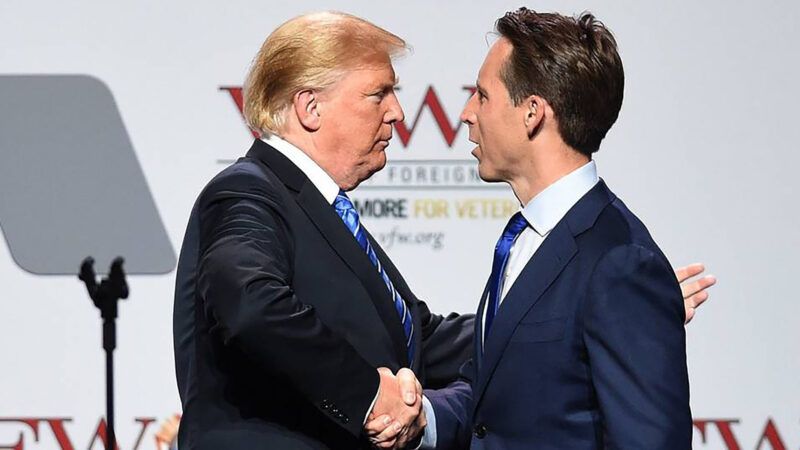Tariff Rebate Checks Are a Bad, Inflationary Idea
If Sen. Josh Hawley and the Trump administration want to spare Americans the pain from tariffs, there is a far simpler solution.

President Donald Trump and his allies have spent months promising that higher tariffs will usher in a "golden age" of wealth and prosperity for America.
Now, the administration and one of its biggest allies in Congress are pushing for a new round of stimulus checks seemingly aimed at easing the economic pain caused by…yes, those same tariff policies.
Sen. Josh Hawley (R–Mo.) has proposed distributing payments of $600 (or more) to every man, woman, and child in the country via a scheme modeled on the direct payments made during the COVID-19 pandemic. A family of four would receive $2,400, for example, if the household qualified for the full value of the stimulus payments, which would phase out for individuals who earned more than $75,000 and married couples who earned more than $150,000. Larger checks would be distributed if tariff revenue exceeds expectations.
According to Hawley, these checks would "allow hard-working Americans to benefit from the wealth that Trump's tariffs are returning to this country."
In reality, of course, those hard-working Americans would merely be getting their own money back. The Yale Budget Lab estimates that the tariffs Trump has imposed this year will cost the average American household about $2,400 annually in the form of higher prices—on everything from new cars to Arizona iced tea.
The proposal to send out tariff-funded stimulus checks should at least put an end to two of the more nonsensical claims that the president and his pro-tariff allies have been making. First, this should confirm that Americans—not foreign governments or corporations—are footing the bill for the tariffs.
Second, the idea that tariffs can be used to close the budget deficit should be similarly put to bed. Some estimates suggest that tariffs are likely to widen the deficit (even without any stimulus checks being mailed out), as they will slow economic growth and reduce future tax revenue. Even if you ignore those dynamic projections, there's a big problem: The $150 billion in tariff revenue collected so far this year can't be used to pay down the budget deficit if it is first going to be redistributed to Americans in the form of rebate checks.
Thankfully, Hawley's idea seems to have landed with a thud in the Senate. In remarks to Semafor, Sen. Bernie Moreno (R–Ohio) called it "insane" and warned that the stimulus checks could be "extraordinarily inflationary."
With inflation still hovering around 3 percent, tariff rebate checks could push that figure higher or force the Federal Reserve to raise interest rates in order to keep inflation in check, warns Alex Durante, a senior economist at the Tax Foundation. Hawley's proposal is "fiscally irresponsible," he writes.
That pretty well sums it up. Trump was returned to office by the voters in large part because of how former President Joe Biden's policies—including those pandemic-era stimulus checks—triggered the worst bout of inflation in four decades. It would be absolute lunacy for the Trump administration to flirt with a similar disaster, particularly when tariffs are already likely to make lots of things more expensive at a time when consumers are keenly aware of price increases.
Nonetheless, that seems to be what the White House wants to do. Trump and Commerce Secretary Howard Lutnick have endorsed the rebate check idea.
If Trump and Hawley want to spare Americans the pain caused by tariffs, there is a much simpler solution here: Get rid of the tariffs.


Show Comments (62)